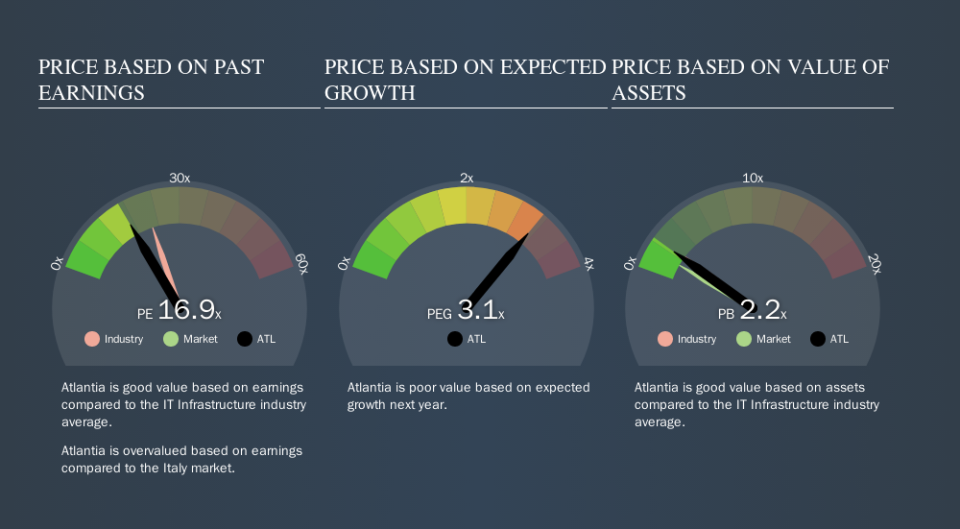Read This Before You Buy Atlantia S.p.A. (BIT:ATL) Because Of Its P/E Ratio

Today, we'll introduce the concept of the P/E ratio for those who are learning about investing. We'll show how you can use Atlantia S.p.A.'s (BIT:ATL) P/E ratio to inform your assessment of the investment opportunity. Atlantia has a P/E ratio of 16.95, based on the last twelve months. That is equivalent to an earnings yield of about 5.9%.
Check out our latest analysis for Atlantia
How Do You Calculate Atlantia's P/E Ratio?
The formula for P/E is:
Price to Earnings Ratio = Share Price ÷ Earnings per Share (EPS)
Or for Atlantia:
P/E of 16.95 = €22.18 ÷ €1.31 (Based on the trailing twelve months to June 2019.)
Is A High Price-to-Earnings Ratio Good?
A higher P/E ratio means that buyers have to pay a higher price for each €1 the company has earned over the last year. That isn't a good or a bad thing on its own, but a high P/E means that buyers have a higher opinion of the business's prospects, relative to stocks with a lower P/E.
How Does Atlantia's P/E Ratio Compare To Its Peers?
The P/E ratio essentially measures market expectations of a company. The image below shows that Atlantia has a lower P/E than the average (22.2) P/E for companies in the infrastructure industry.
This suggests that market participants think Atlantia will underperform other companies in its industry. Many investors like to buy stocks when the market is pessimistic about their prospects. If you consider the stock interesting, further research is recommended. For example, I often monitor director buying and selling.
How Growth Rates Impact P/E Ratios
P/E ratios primarily reflect market expectations around earnings growth rates. If earnings are growing quickly, then the 'E' in the equation will increase faster than it would otherwise. And in that case, the P/E ratio itself will drop rather quickly. And as that P/E ratio drops, the company will look cheap, unless its share price increases.
Atlantia shrunk earnings per share by 9.5% last year. But over the longer term (5 years) earnings per share have increased by 9.4%.
Remember: P/E Ratios Don't Consider The Balance Sheet
The 'Price' in P/E reflects the market capitalization of the company. So it won't reflect the advantage of cash, or disadvantage of debt. Hypothetically, a company could reduce its future P/E ratio by spending its cash (or taking on debt) to achieve higher earnings.
Spending on growth might be good or bad a few years later, but the point is that the P/E ratio does not account for the option (or lack thereof).
How Does Atlantia's Debt Impact Its P/E Ratio?
Net debt totals a substantial 242% of Atlantia's market cap. If you want to compare its P/E ratio to other companies, you must keep in mind that these debt levels would usually warrant a relatively low P/E.
The Verdict On Atlantia's P/E Ratio
Atlantia's P/E is 16.9 which is about average (16.7) in the IT market. With significant debt and no EPS growth last year, the P/E suggests shareholders are expecting higher profit in the future.
Investors have an opportunity when market expectations about a stock are wrong. If the reality for a company is better than it expects, you can make money by buying and holding for the long term. So this free report on the analyst consensus forecasts could help you make a master move on this stock.
You might be able to find a better buy than Atlantia. If you want a selection of possible winners, check out this free list of interesting companies that trade on a P/E below 20 (but have proven they can grow earnings).
We aim to bring you long-term focused research analysis driven by fundamental data. Note that our analysis may not factor in the latest price-sensitive company announcements or qualitative material.
If you spot an error that warrants correction, please contact the editor at editorial-team@simplywallst.com. This article by Simply Wall St is general in nature. It does not constitute a recommendation to buy or sell any stock, and does not take account of your objectives, or your financial situation. Simply Wall St has no position in the stocks mentioned. Thank you for reading.

